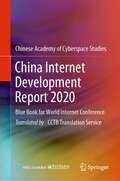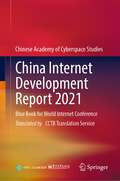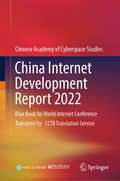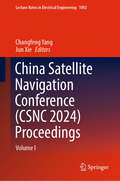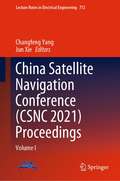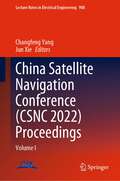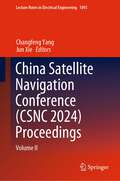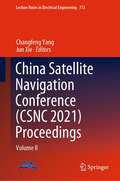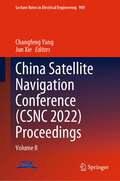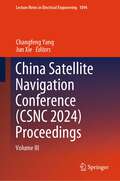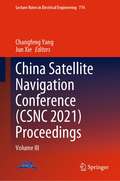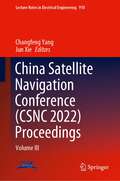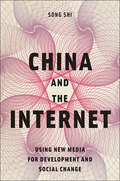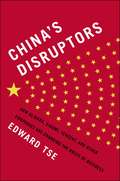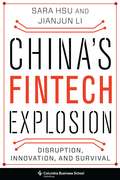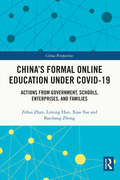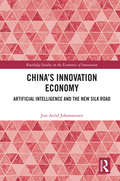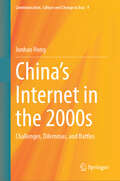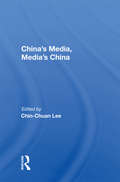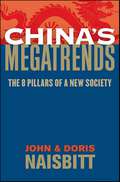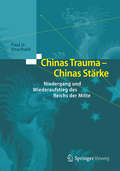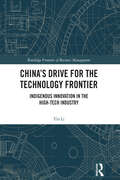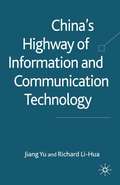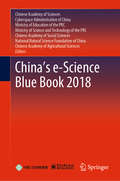- Table View
- List View
China Internet Development Report 2020: Blue Book for World Internet Conference
by Chinese Academy of Cyberspace StudiesThis book systematically summarizes the development process of China Internet in 2020, reveals the strong impact of Internet on China's economic development and social progress, and displays the course of the Chinese people's changes from beneficiary and participant to builder, contributor, and joint maintainer of cyberspace development and security during the Internet development; objectively reflects the development achievements, development status, and development trend of China Internet in 2020, systematically summarizes the main experience in the development of China Internet, and deeply analyzes China's strategic planning, policy actions, development results, practical level and future trend in information infrastructure, network information technology, digital economy, E-government, construction and management of network contents, network security, legal construction of cyberspace, international cyberspace governance, and other aspects; further improves the index system for the development of China Internet and makes an overall assessment of network security and informatization work in 31 provinces (autonomous regions and municipalities directly under the central government, excluding Hong Kong, Macao, and Taiwan) throughout China from 6 aspects, in the hope of reflecting the Internet development level throughout China and individual places comprehensively and accurately. With the important thoughts of General Secretary Xi Jinping on the national cyber development strategy as the main line running through the book, this book collects the latest research results in the domestic Internet field and utilizes the latest cases and authoritative data; featuring rich contents and highlights, this book helps the public readers to better comprehend the rich implications, spiritual essence, and practice requirements of the Internet governance concepts, thoughts, and opinions of General Secretary Xi Jinping and provides an important reference value for the employees in the Internet fields, such as government departments, Internet enterprises, scientific research institutions, colleges, and universities to fully understand and master the development of the China Internet.
China Internet Development Report 2021: Blue Book for World Internet Conference
by Publishing House of Electronics IndustryThis book objectively represents the achievements, status quo, and trends of China Internet development in 2021, systematically summarizes the main experience of China Internet development, and deeply analyzes the strategic planning, policies and measures, and development achievements, level, and trends in China in terms of eight aspects, i.e., information infrastructure, information technology, digital economy, e-government, cyber content, cybersecurity, cyberlaws, international cyberspace governance, and exchanges and cooperation. This book further optimizes the index system of China Internet development and comprehensively evaluates the work of cybersecurity and informatization in 31 provinces (autonomous regions, municipalities directly under the Central Government, excluding Hong Kong, Macao, and Taiwan) across the country from six dimensions, in order to mirror Internet development level in China and various regions in a comprehensive, accurate, and objective way.This book collects the latest research results in China Internet development and selects the latest cases and reliable data. With diverse subjects and detailed discussion, this book possesses great significance for these engaged in Internet field in governmental departments, Internet enterprises, scientific research institutions, and universities, who hope to fully understand China Internet development.
China Internet Development Report 2022: Blue Book for World Internet Conference
by Publishing House of Electronics IndustryThis book objectively presents the achievements, status quo, and trends of China's Internet development in 2022, systematically summarizes the major experiences of China's Internet development, and deeply analyses the strategic planning, policies and measures, and development achievements, level and trends in China in terms of eight aspects, i.e. information infrastructure, digital economy, e-government, digital society, cyber content, cybersecurity, cyber law, international cyberspace governance, and exchange and cooperation. This book further optimizes the index system of China's Internet development and comprehensively evaluates the work of cybersecurity and informatisation in 31 provinces (autonomous regions, municipalities directly under the Central Government, excluding Hong Kong, Macao and Taiwan) across the country from six dimensions, so as to reflect the Internet development level in China and various regions in a comprehensive, accurate and objective way. This book collects the latest research results on China's Internet development and selects the most recent cases and reliable data. With diverse topics and in-depth discussions, this book is of great significance to those involved in the Internet field in government departments, Internet enterprises, scientific research institutions, and universities who hope to fully understand China's Internet development.
China Livestreaming E-commerce Industry Insights
by Ruo SiThis book analyzes multiple aspects of the Chinese livestreaming e-commerce industry, including its development and evolution, macro environment, market landscape, platforms, streamer structure trends, influencers, production, and explosive marketing methods, MCN operations, risk assessment and policy management. It not only describes the highly developed state of the industry in China and how it has advanced further as a result of COVID lockdowns, but also focuses on the problems of livestreaming e-commerce and proposes solutions and development strategies.Investigating the development trends, the book also discusses how far livestreaming e-commerce can go during the wind-up period. In particular, based on the underlying logic of people, goods and fields, it assesses the streamer structure of universal participation, product selection, goods supply and price setting, exploring the scene marketing methods of pop-up conversion and the strategic layout of the operating platform. It objectively describes the current state of the Chinese livestreaming e-commerce market, and taking into account Chinese social, cultural, and economic characteristics, proposes solutions to problems in the livestreaming e-commerce industry. This unique book reflects on the Chinese livestreaming e-commerce, and offers insights to help readers understand the industry and the process of industrialization. It is intended for a wide range of readers, ranging from non-experts interested in livestreaming e-commerce, to professionals wanting an overview of the industry’s development.
China Satellite Navigation Conference: Volume I (Lecture Notes in Electrical Engineering #1092)
by Changfeng Yang Jun XieThis book presents selected research papers from China Satellite Navigation Conference (CSNC) 2024, held in Jinan, China, on 22–24 May 2024. These papers discuss the technologies and applications of the Global Navigation Satellite System (GNSS) and in particular the latest advances in the China BeiDou System (BDS). They are divided into 8 topics to match the corresponding sessions at CSNC 2024, which broadly covered key topics in GNSS. Readers learn about the BDS and keep abreast of the latest advances in GNSS technologies and applications.
China Satellite Navigation Conference: Volume I (Lecture Notes in Electrical Engineering #772)
by Changfeng Yang Jun XieChina Satellite Navigation Conference (CSNC 2021) Proceedings presents selected research papers from CSNC 2021 held during 22nd-25th May, 2021 in Nanchang, China. These papers discuss the technologies and applications of the Global Navigation Satellite System (GNSS), and the latest progress made in the China BeiDou System (BDS) especially. They are divided into 10 topics to match the corresponding sessions in CSNC2021 which broadly covered key topics in GNSS. Readers can learn about the BDS and keep abreast of the latest advances in GNSS techniques and applications.
China Satellite Navigation Conference: Volume I (Lecture Notes in Electrical Engineering #908)
by Changfeng Yang Jun XieChina Satellite Navigation Conference (CSNC 2022) Proceedings presents selected research papers from CSNC 2022 held during 25th-27th May, 2022 in Beijing, China. These papers discuss the technologies and applications of the Global Navigation Satellite System (GNSS), and the latest progress made in the China BeiDou System (BDS) especially. They are divided into 10 topics to match the corresponding sessions in CSNC2022 which broadly covered key topics in GNSS. Readers can learn about the BDS and keep abreast of the latest advances in GNSS techniques and applications.
China Satellite Navigation Conference: Volume II (Lecture Notes in Electrical Engineering #1093)
by Changfeng Yang Jun XieThis book presents selected research papers from China Satellite Navigation Conference (CSNC) 2024, held in Jinan, China, on 22–24 May 2024. These papers discuss the technologies and applications of the Global Navigation Satellite System (GNSS) and in particular the latest advances in the China BeiDou System (BDS). They are divided into 8 topics to match the corresponding sessions at CSNC 2024, which broadly covered key topics in GNSS. Readers learn about the BDS and keep abreast of the latest advances in GNSS technologies and applications.
China Satellite Navigation Conference: Volume II (Lecture Notes in Electrical Engineering #773)
by Changfeng Yang Jun XieChina Satellite Navigation Conference (CSNC 2021) Proceedings presents selected research papers from CSNC 2021 held during 22nd-25th May, 2021 in Nanchang, China. These papers discuss the technologies and applications of the Global Navigation Satellite System (GNSS), and the latest progress made in the China BeiDou System (BDS) especially. They are divided into 10 topics to match the corresponding sessions in CSNC2021 which broadly covered key topics in GNSS. Readers can learn about the BDS and keep abreast of the latest advances in GNSS techniques and applications.
China Satellite Navigation Conference: Volume II (Lecture Notes in Electrical Engineering #909)
by Changfeng Yang Jun XieChina Satellite Navigation Conference (CSNC 2022) Proceedings presents selected research papers from CSNC 2022 held during 22nd-25th May, 2022 in Beijing, China. These papers discuss the technologies and applications of the Global Navigation Satellite System (GNSS), and the latest progress made in the China BeiDou System (BDS) especially. They are divided into 10 topics to match the corresponding sessions in CSNC2022 which broadly covered key topics in GNSS. Readers can learn about the BDS and keep abreast of the latest advances in GNSS techniques and applications.
China Satellite Navigation Conference: Volume III (Lecture Notes in Electrical Engineering #1094)
by Changfeng Yang Jun XieThis book presents selected research papers from China Satellite Navigation Conference (CSNC) 2024, held in Jinan, China, on 22–24 May 2024. These papers discuss the technologies and applications of the Global Navigation Satellite System (GNSS) and in particular the latest advances in the China BeiDou System (BDS). They are divided into 8 topics to match the corresponding sessions at CSNC 2024, which broadly covered key topics in GNSS. Readers learn about the BDS and keep abreast of the latest advances in GNSS technologies and applications.
China Satellite Navigation Conference: Volume III (Lecture Notes in Electrical Engineering #774)
by Changfeng Yang Jun XieChina Satellite Navigation Conference (CSNC 2021) Proceedings presents selected research papers from CSNC 2021 held during 22nd-25th May, 2021 in Nanchang, China. These papers discuss the technologies and applications of the Global Navigation Satellite System (GNSS), and the latest progress made in the China BeiDou System (BDS) especially. They are divided into 10 topics to match the corresponding sessions in CSNC2021 which broadly covered key topics in GNSS. Readers can learn about the BDS and keep abreast of the latest advances in GNSS techniques and applications.
China Satellite Navigation Conference: Volume III (Lecture Notes in Electrical Engineering #910)
by Changfeng Yang Jun XieChina Satellite Navigation Conference (CSNC 2022) Proceedings presents selected research papers from CSNC 2022 held during 25th-27th May, 2022 in Beijing, China. These papers discuss the technologies and applications of the Global Navigation Satellite System (GNSS), and the latest progress made in the China BeiDou System (BDS) especially. They are divided into 10 topics to match the corresponding sessions in CSNC2022 which broadly covered key topics in GNSS. Readers can learn about the BDS and keep abreast of the latest advances in GNSS techniques and applications.
China and the Internet: Using New Media for Development and Social Change
by Song ShiTwo oversimplified narratives have long dominated news reports and academic studies of China’s Internet: one lauding its potentials to boost commerce, the other bemoaning state control and measures against the forces of political transformations. This bifurcation obscures the complexity of the dynamic forces operating on the Chinese Internet and the diversity of Internet-related phenomena. China and the Internet analyzes how Chinese activists, NGOs, and government offices have used the Internet to fight rural malnutrition, the digital divide, the COVID-19 pandemic, and other urgent problems affecting millions of people. It presents five theoretically informed case studies of how new media have been used in interventions for development and social change, including how activists battled against COVID-19. In addition, this book applies a Communication for Development approach to examine the use and impact of China’s Internet. Although it is widely used internationally in Internet studies, Communication for Development has not been rigorously applied in studies of China’s Internet. This approach offers a new perspective to examine the Internet and related phenomena in Chinese society.
China's Disruptors: How Alibaba, Xiaomi, Tencent, and Other Companies are Changing the Rules of Business
by Edward TseIn September 2014, Chinese e-commerce giant Alibaba raised $25 billion in the world's biggest-ever initial public offering. Since then, millions of investors and managers worldwide have pondered a fundamental question: What's really going on with the new wave of China's disruptors? Alibaba wasn't an outlier--it's one of a rising tide of thriving Chinese companies, mostly but not exclusively in the technology sector. Overnight, its founder, Jack Ma, appeared on the same magazine covers as American entrepreneurial icons like Mark Zuckerberg. Ma was quickly followed by the founders of other previously little-known companies, such as Baidu, Tencent, and Xiaomi.Over the past two decades, an unprecedented burst of entrepreneurialism has transformed China's economy from a closed, impoverished, state-run system into a major power in global business. As products in China become more and more sophisticated, and as its companies embrace domestically developed technology, we will increasingly see Chinese goods setting global standards. Meanwhile, companies in the rest of the world wonder how they can access the fast-rising incomes of China's 1.3 billion consumers.Now Edward Tse, a leading global strategy consultant, reveals how China got to this point, and what the country's rise means for the United States and the rest of the world. Tse has spent more than twenty years working with senior Chinese executives, learning firsthand how China's most powerful companies operate. He's an expert on how private firms are thriving in what is still, officially, a communist country. His book draws on exclusive interviews and case studies to explore questions such as*What drives China's entrepreneurs? Personal fame and fortune--or a quest for national pride and communal achievement?*How do these companies grow so quickly? In 2005, Lenovo sold just one category of products (personal computers) in one market, China. Today, not only is it the world's largest PC seller; it is also the world's third-largest smartphone seller.*How does Chinese culture shape the strategies and tactics of these business leaders? Can outsiders copy what the Chinese are doing?*Can capitalists really thrive within a communist system? How does Tencent's Pony Ma serve as a member of China's parliament while running a company that dominates online games and messaging?*What impact will China have on the rest of the world as its private companies enter new markets, acquire foreign businesses, and threaten established firms in countless industries?As Tse concludes: "I believe that as a consequence of the opening driven by China's entrepreneurs, the push to invest in science, research, and development, and the new freedoms that people are enjoying across the country, China has embarked on a renaissance that could rival its greatest era in history--the Tang dynasty. These entrepreneurs are the front line in China's intense hunger for success. They will have an even more remarkable impact on the global economy in the future, through the rest of this decade and beyond."From the Hardcover edition.
China's Fintech Explosion: Disruption, Innovation, and Survival
by Jianjun Li Sara HsuFinancial technology—or fintech—is gaining in popularity globally as a way of making financial services more efficient and accessible. In rapidly developing China, fintech is taking off, catering to markets that state-owned banks and an undersized financial sector do not serve amid a backdrop of growing consumption and a large, tech-savvy millennial generation. It is becoming increasingly likely that some of China’s fintech firms will change the way the world does business.In China’s Fintech Explosion, Sara Hsu and Jianjun Li explore the transformative potential of China’s financial-technology industry, describing the risks and rewards for participants as well as the impact on consumers. They cover fintech’s many subsectors, such as digital payment systems, peer-to-peer lending and crowdfunding, credit card issuance, internet banks, blockchain finance and virtual currencies, and online insurance. The book highlights the disruption of traditional banking as well as the risks of fintech and regulatory technology. Hsu and Li describe major companies including Alipay and Tencent, developer of WeChat Pay and a wealth-management business, and other leading fintech firms such as Creditease, Zhong An Insurance, and JD Finance. Offering expert analysis of market potential, risks, and competition, as well as case studies of firms and consumer behavior, China’s Fintech Explosion is a must-read for anyone interested in one of the world’s breakout sectors.
China's Formal Online Education under COVID-19: Actions from Government, Schools, Enterprises, and Families (China Perspectives)
by Zehui Zhan Xiao Yao Liming Huo Baichang ZhongThis book investigates how schools, enterprises and families in China have coped with the formal online education in the light of government policy throughout the COVID-19 epidemic outbreak, with special focus on the problems they have encountered and possible solutions. Using grounded theory, over 1000 posts retrieved from public online forums were analyzed under a 4*4 framework, referring to four special time nodes (proposal period, exploratory period, full deployed period, exiting period) and four major subjects (government, schools, enterprises, families). The book identifies four main issues faced by massive online education during the epidemic: platform selection in proposal period, teacher training in exploratory period, resource integration in full deployed period, and flexibility of returning to schools in exiting period. These findings enlighten us with a deeper understanding of the process of online learning in an educational emergency, helping to develop best countermeasures in similar situations, as well as to provide paths to follow for other countries. The book will appeal to teachers, researchers and school administrators of the online education and education emergency management, as well as those who are interested in Chinese education during the COVID-19 outbreak in general.
China's Innovation Economy: Artificial Intelligence and the New Silk Road (Routledge Studies in the Economics of Innovation)
by Jon-Arild JohannessenTwo trends will have more influence than anything else on the world’s future political and economic situation: the development of artificial intelligence and the emergence of China as a competitor to the United States on the international stage. This book is about the emerging innovation economy. It uses systems theory and evolutionary economics as a theoretical point of departure and explains why the focal point of the geopolitical stage is moving away from the alliance between the United States and Europe, and towards an alliance between China, the 14 Regional Comprehensive Economic Partnership countries, the countries along the new silk road, and Europe. The book argues that the globalization strategy of neoliberalism laid the foundation for the Chinese economic engine. Whereas the old globalization was driven by cost differences generally, and wage costs specifically, the new globalization is driven by divergence in competence in general, and technological competence in particular, and China’s primary goal is to develop artificial intelligence and intelligent robots. Further, the book posits that the interactions between the climate crisis and the new technology will change production, distribution and the creation of profits, both in China and more widely in the global innovation economy. The book develops a structure to describe, analyze and explain the Chinese innovation economy and contributes to the discussion regarding technological developments in China. The book is written for readers who are oriented towards the new globalization that is emerging in the innovation economy and the factors driving China's economic growth.
China's Internet in the 2000s: Challenges, Dilemmas, and Battles (Communication, Culture and Change in Asia #9)
by Junhao HongThis book studies China’s Internet in the 2000s, with a focus on the challenges and dilemmas of the authorities and the battles between the authorities and the newly networked society in the cyber space, which has been a critical centerpiece in the Chinese authorities' struggle for political stability. The book also examines the distinct technological means and political/legal regulations/restrictions used for Internet control, unique characteristics, and the implications of their influences on the political change and social transformation of the world’s most populous country. It illuminates the fierce competition between the authorities and the newly networked Chinese society by looking at how Chinese netizens make every possible effort to gain access to the Internet for truth and make their voices and views heard, while how the authorities use whatever possible means to prevent that from happening. The in-depth analyses of how these challenges, dilemmas and battles have been affecting and changing China’s political system, the ruling communist ideology, the public’s access to information as well as the expression of the public’s discourse are relevant to policymakers and analysts in both business and government sectors, as well as scholars and researchers with an interest in Asian Studies, Chinese Studies, communication, new media, political science, and sociology.
China's Media, Media's China
by Chin-Chuan LeeThis book explores the rapidly evolving conditions of political communication in China. It examines how ideology and professional roles affect both scholarly and journalistic understanding of China. The book offers insights into Chinese journalism and Sino-American relations. .
China's Megatrends: The 8 Pillars of a New Society
by John Naisbitt Doris Naisbitt“[John Naisbitt’s] vision of the world’s economy has the mark of genius.” —Minneapolis Star TribuneInternationally-renowned futurist and bestselling author John Naisbitt is back with China’s Megatrends, the most comprehensive look at the present and future of China and the transformation that is reshaping its economic, political, and social systems. Since publishing the enormously popular Megatrends—a New York Times bestseller for two years that has been published in 57 countries—John Naisbitt has become the most respected and well-known prognosticator of global trends. To write China’s Megatrends, Naisbitt and wife Doris were granted unprecedented access by the Chinese government to all aspects of the country and its social model. Using the same techniques of information gathering and analysis as Megatrends, the Naisbitts present a prescient and unique perspective on the emergent global power and its role in the future of globalization.
Chinas Trauma – Chinas Stärke
by Paul U. UnschuldPaul U. Unschuld bietet eine kulturhistorisch begründete Analyse der politischen Geschichte Chinas der vergangenen zwei Jahrhunderte. Ein erster Teil beschreibt die verschiedenen Traumata, die dem Land im 19. und frühen 20. Jahrhundert durch ausländische Interventionen zugefügt wurden. In der zweiten Hälfte werden die Ursachen offen gelegt, die zu einem historisch einmaligen Vorgang geführt haben: dem Wiederaufstieg eines Staates, der von Staaten einer fremden, militärisch-technisch überlegenen Kultur besiegt und an den Rand des Abgrunds gebracht wurde. In seinem Geleitwort erläutert Ulrich Sendler die Bedeutung des Wissens um diese Hintergründe für ein Verständnis der Motivation und Erfolgsaussichten der Modernisierungsstrategien Chinas in einer zunehmend digitalisierten Welt.
China’s Drive for the Technology Frontier: Indigenous Innovation in the High-Tech Industry (Routledge Frontiers of Business Management)
by Yin LiChina has become an innovation powerhouse in high-tech industries, but the widely held view assumes the Chinese model is built on technological borrowing and state capitalism. This book debunks the myths surrounding the Chinese model with a fresh take on China’s strategies for technological innovation. The central argument is that indigenous innovation plays a critical role in transforming the Chinese high-tech industry. Like any successfully industrialized nation in history, indigenous innovation in China allows industrial enterprises to assimilate knowledge developed elsewhere, utilize science and technology resources and human capabilities accumulated in the country, and eventually approach the technological frontier. The question is, how do Chinese businesses and governments engage in indigenous innovation? Employing the "social conditions of innovative enterprise" framework developed by William Lazonick and colleagues, this book analyzes how the interaction of strategy, organization, and finance in leading Chinese high-tech firms underpinned by national institutions enables indigenous innovation with Chinese characteristics. It features detailed case studies of two critical high-tech industries—the telecom-equipment industry and the semiconductor industry—and within them, the business histories of leading Chinese innovators. The in-depth look into China’s experience in indigenous innovation provides valuable lessons for advanced and emerging economies.
China’s Highway of Information and Communication Technology
by Jiang Yu Richard Li-HuaBased on first-hand information obtained from Chinese and Foreign enterprises and institutions in the Chinese ICT industry, this book presents a comprehensive analysis of the evolution of Chinese ICT industrial sector. It especially analyzes the strengths, weaknesses, and threats facing both the Chinese enterprise and western multinationals.
China’s e-Science Blue Book 2018
by Chinese Academy of Social Sciences Chinese Academy of Sciences Cyberspace Administration of China Ministry of Education of the PRC Ministry of Science Technology of the PRC National Natural Science Foundation of China Chinese Academy of Agricultural SciencesThis book is jointly compiled by Chinese Academy of Sciences, Cyberspace Administration of China, Ministry of Education of the People’s Republic of China, Ministry of Science and Technology of the People’s Republic of China, Chinese Academy of Social Sciences, National Natural Science Foundation of China and Chinese Academy of Agricultural Sciences. Over the past several years, Chinese scholars have contributed numerous research works on the development of Chinese scientific information and technology, and produced a range of outstanding achievements. Focusing on the main topic of e-Science, this book explores the forefront of science and technology around the globe, the major demands in China and the main fields in China’s economic development. Furthermore, it reviews the major achievements and the typical cases in China's e-Science research. It provides a valuable reference source for future technological innovations and will introduce researchers and students in the area of e-Science to the latest results in China.
